Highlights
SysCom Cross-Country Event in Nairobi (September 2024)
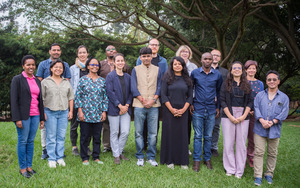
This year, SysCom Kenya hosted the cross-country event in Nairobi, bringing together SysCom team members from the four continents. Over the course of a five days, the country teams presented their progress, reflected on past activities, and discussed their sustainability strategies of the SysCom trials beyond the project phase V. The event, facilitated by FiBL, was crucial in fostering our collaboration across tropical countries and to share knowledge about sustainable farming practices in the tropics. Special highlights included a visit to the long-term experiment (LTE) site in Thika, as well as a farmer visit in Kangari where farmers demonstrated how they prepare bio-pesticides, as part of the participatory on-farm research (POR) activities. Additionally, the team had the opportunity to learn about organic marketing initiatives in Nairobi during a field trip organized by a FiBL partner organizsation the Kenya Organic Agriculture Network (KOAN).
Tropentag in Vienna (September 2024)
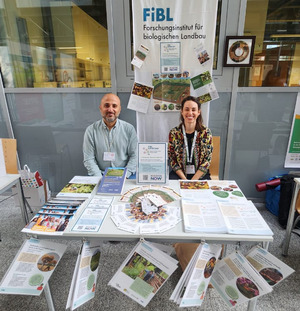
At Tropentag 2024 in Vienna, Seraina from the SysCom program coordination together with her FiBL collegues Lauren Dietemann, Tanay Joshi and Harun Cicek actively promoted and disseminated findings from several FiBL projects, including SysCom. Together they hosted a FiBL stand, showcasing key research results and offering attendees valuable insights into the comparison of organic and conventional farming practices. Lauren presented the findings from the policy dossier that was published this year and Seraina moderated a side session on Agroecology ("Drivers of adoption, impact of practices and lessons learned") fostering meaningful exchanges between researchers working agroecological topics in different contexts.
View this short form video for more impressions.
BioRe baseline exchange meeting in Tansania (September 2024)
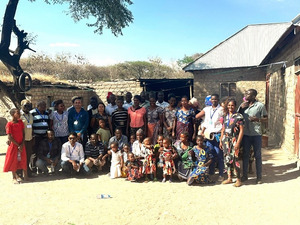
The SysCom India team participated in the baseline exchange meeting of bioRe in Tanzania in September. The Swiss foundation bioRe has been active in India and Tansania for 26 years and seeks to achieve a more dominant role of organic cotton in Tansania. During the visit the SysCom India team shared developed innovations with farmers, determined topics for cross-country exchange and areas for future collaboration, to benefit organic cotton farmers in Tanzania.
3D visit of SysCom Bolivia at conference in Lima (August 2024)
In August 2024 a joint team from ECOTOP and FiBL represented the Sara Ana Centre and the SysCom activities in Bolivia at the “Salon de chocolate y cacao” in Lima. This event is the biggest chocolate fair of the continent with thousands of visitors including farmers, technicians, value chain companies and others. This year it was of particular interest as Switzerland was the invited country. The stand featured the SysCom Bolivia training materials as well as a visit in 3D of the long-term trial. There was a great interest of farmers, technical staff, business owners as well as political representatives. The presence of the SysCom team in Lima was financially supported by the SysCom project, Ecotop Foundation and Swissco.
The 3D visit can be accessed here.
Women Farmers Workshop in India (July 2024)
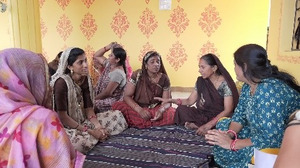
Within SysCom India a participatory workshop was held with around 30 women farmers from various age groups to collaboratively develop training materials focused on women's health. The goal was to identify the health-related topics where the women felt they needed more guidance. Based on the discussions, we are now designing a range of training materials, including comic books and leaflets. These materials will be tailored to different age groups, recognizing that health concerns and their impact on farming activities vary across life stages.
Stakeholder Event in Kenya (June 2024)
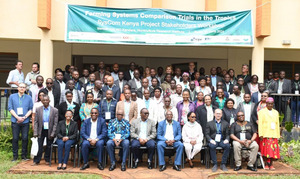
The stakeholder event was a great opportunity to disseminate research findings under the SysCom Kenya project to a wide range of actors, including Kenyan researchers, policymakers and farmers. The workshop celebrated the project's success so far and showed that organic farming and agro-ecological approaches can achieve similar yields compared to conventional farming if managed holistically. In addition, these alternative approaches benefit soil fertility, biodiversity, and environmental and human health. Workshop participants agreed that more investment in research and capacity building is necessary to boost sustainable farming systems.
Advocating Organic Farming for Sustainable Nitrogen Management in Africa - Webinar by UNEP (June 2024)
This webinar, conducted by the multi-stakeholder group Global Partnership on Nutrient Management, was part of a series of technical webinars designed to share information and highlight the importance of nutrient flows and their impacts on global society. This webinar aimed to showcase organic farming strategies and their potential to promote sustainable nitrogen management in Africa. Dr. Milka Kiboi (FiBL) presented on the nitrogen budgets and flows in African smallholder farming systems.
African Fertilizer & Soil Health Summit (May 2024)
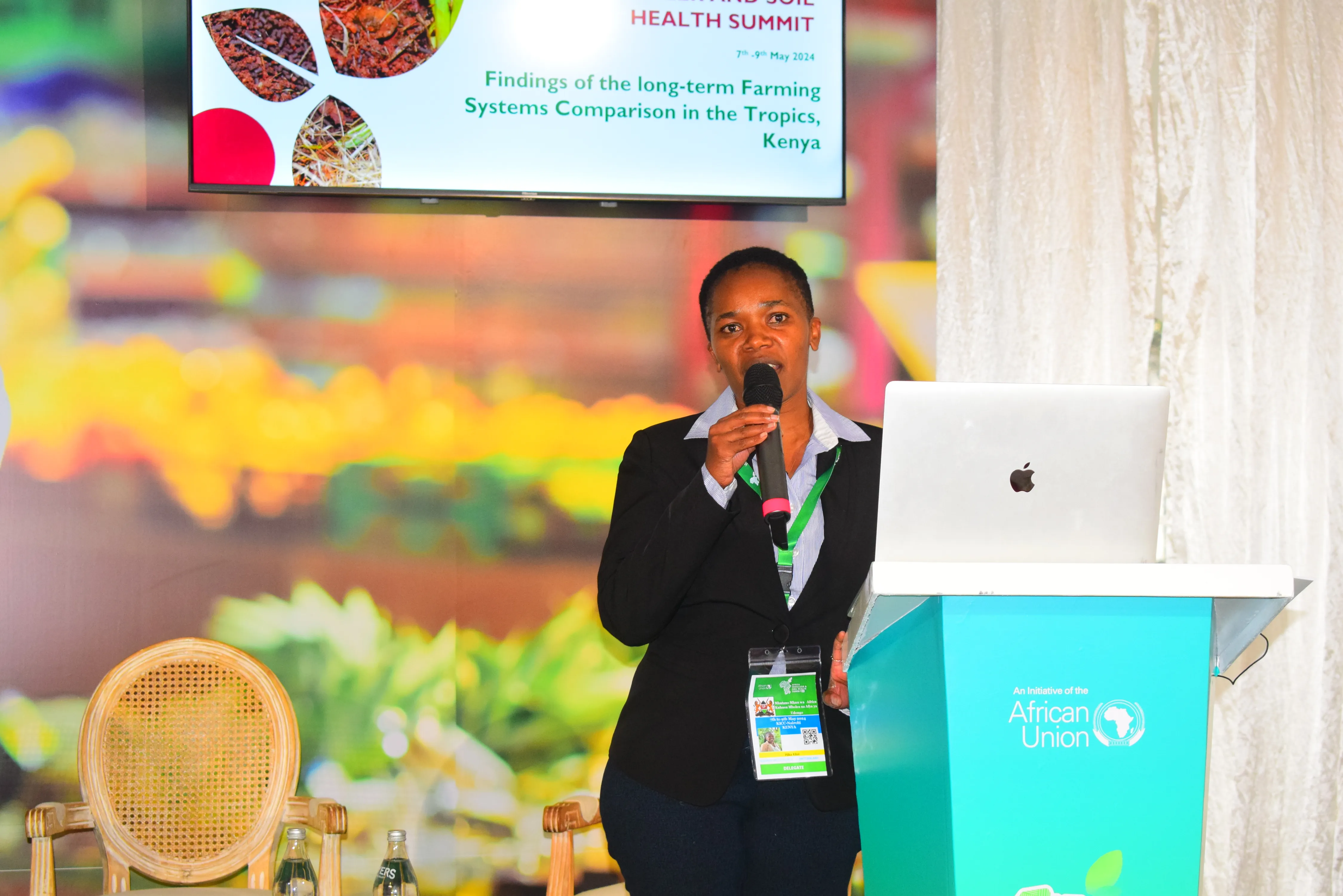
The summit deliberated and sought solutions to the widespread degradation of soil quality in Africa - a challenge that has long-term implications for our agricultural productivity and food security. Dr. Milka Kiboi (SysCom Kenya), together with Dr. David Amudavi from Biovision Africa Trust, presented the landscapes of agroecology and initiatives in Africa and reported on the results of the long-term comparison of cropping systems in the tropics and in Kenya. At the end of the summit, African heads of state and government adopted the "Nairobi Declaration on Fertilizers and Soil Health", demonstrating their commitment to restoring the nutrient balance of the continent's soils. This declaration could lead to the increased use of biofertilizers.
The recording of this summit can be found here, whereas Dr. Milka Kiboi's presentation starts at 0:50h.
International course for cacao agroforestry trainers in Latin America (April 2024)
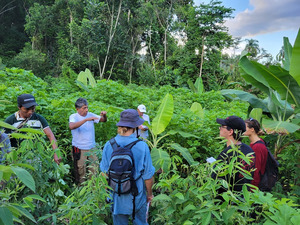
In April, the Sara Ana Centre hosted the 2nd International Course for Latin American Trainers on Organic Cacao Production in Agroforestry Systems. Organized in collaboration with all SysCom partners, the course brought together 24 participants from various Latin American countries. This course plays a crucial role in promoting sustainable agricultural practices and empowering local trainers to spread knowledge on organic cacao production within agroforestry systems. By fostering collaboration and knowledge exchange among participants, the program contributes to the long-term resilience of cacao farming communities across Latin America. The event was held as part of a project funded by the Leopold Bachmann Foundation.
Cross country publication on organic agriculture in the tropics: a contributor to local livelihoods (April 2024)

A recent paper published by Riar et al. demonstrates that organic production systems in the tropics are as profitable as conventional systems. The paper emphasises that organic farming does not solely rely on main cash crops for export to generate income. Associated and rotational crops play a crucial role in enhancing farm profitability, these have been largely overlooked up to this point. The paper is based on data from 12 years of long-term organic trials in Bolivia, India, and Kenya, and offers new insights into the art and science of organic farming in the tropics.
Farmer empowerment workshop (March 2024)
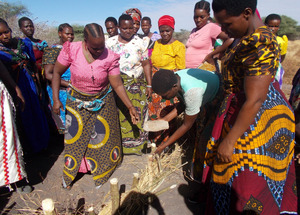
In March, the bioRe foundation organized a farmer empowerment event, which brought together approximately 500 farmers from the region. The event was designed not only to empower farmers but also to create a space for sharing knowledge and fostering stronger connections within the agricultural network. One of the key highlights of the event was the dissemination of valuable research findings from the SysCom India project. The results, compiled into leaflets and brochures, were distributed among the attendees. By sharing these materials, the bioRe Association aimed to provide farmers with practical insights and evidence-based information that could help them improve their agricultural practices, enhance productivity, and make more informed decisions in their farming operations.
Discussion on policy dossier at BIOFACH (February 2024)
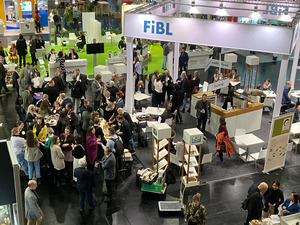
Economic performance is key for a sustainable supply chain – even stronger in the Global South. In temperate zones, there is research showing evidence for the best practices of OA. However, limited insights exist about tropical organic systems that can be promoted from a scientific perspective. At BIOFACH 2024 the key messages from research summarized in the just published 2024 FiBL policy dossier were presented. In a podium discussion moderated by Lauren Dietemann (FiBL), the experts Olugbenga Adeoluwaoo (NOARA/WAFRONET), David Amudavi (BVAT, Kenya), Beate Huber (FiBL) and Irene Kadzere (FiBL) discussed the findings.
New videos for SysCom Bolivia (February 2024)
In February 2024, four new videos were published on the FiBL, ECOTOP, and Sara Ana YouTube channels, featuring key insights into sustainable agroforestry practices. The videos draw from the SysCom Bolivia research results and cover the importance of tree stratification for crop health, the technique of shade tree pruning for cacao productivity and the management of lateral buds in banana trees. They are available with both English and German subtitles, these videos provide valuable guidance for farmers and researchers, showcasing practical knowledge for enhancing agroforestry system management in Bolivia. Watch the english version on coffee as a by-crop in cacao agroforestry systems here.
New policy dossier on agroecology in the tropics (February 2024)
Organic agriculture and agroecology show promise in achieving sufficient yields and income, and help lower negative costs to the public. FiBL summarises the latest scientific evidence in its policy dossier "Cultivating change with agroecology and organic agriculture in the tropics". It offers 11 opportunities for change for decision-makers, policymakers, and experts in international cooperation. Overcoming present and future challenges will require educated and empowered stakeholders involved in international cooperation who support and develop strategies for transitioning to agroecology and organic agriculture. The policy dossier is aimed at these stakeholders with the goal of connecting scientific insights with practical implementation.
Social Media for SysCom Bolivia (January 2024)

To reach a broader public and for creating an active community with people who visited Sara Ana Centre, social media channels for Sara Ana as well as website in Spanish were launched in 2024. The goal of these channels is not only to communicate about the experience and scientific results of SysCom, but also to promote the local actors and their long-lasting experiences in organic cacao production and (dynamic) agroforestry systems. Together with the scientific results of SysCom, the experiences of farmers and institutions represent a rich base of knowledge, helping others to take a more sustainable way of production of cacao and other tropical crops. The project was financed by Leopold Bachmann Foundation.
Global Forum for Food and Agriculture (January 2024)
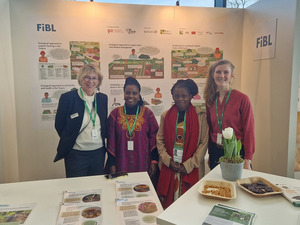
In this year's conference for agricultural ministers from all over the world, special attention was paid to food security in times of crisis. FiBL participated in showcasing its work at the Innovation Forum event. The theme of the FiBL stand was "Promoting sustainable production and food sovereignty - Strengthening smallholders". The stand, headed by Beate Huber, Vice-chairwoman of the Management Board of FiBL Switzerland, was well attended. Guests included ministers, state secretaries, and other high-ranking representatives from public authorities and private institutions from all over the world.
International confrerence on international research on food security - Tropentag (September 2023)
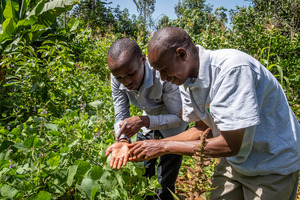
SysCom was strongly represented at the Tropentag in Berlin, the International Conference on International Research on Food Security, Natural Resource Management, and Rural Development, a worldwide network of scientists from different disciplines. The conference attracted around 1200 participants from all over the world and is the leading conference on this topic in Europe. The SysCom team and partners could present its results in countless scientific contributions. SysCom India alone, with its Indian partners, had eight contributions.
Agroecology and organic farming and the contribution to global food security - Tropentag pre-event (September 2023)
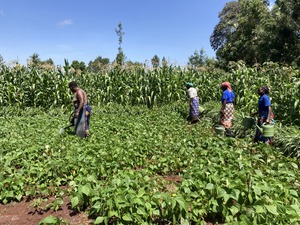
The Pre-Event to the Tropentag Conference was hosted by FiBL and partners to stimulate a political debate on the role of organic agriculture and agroecology in the international development policy frameworks. FiBL researchers presented to an audience including participants from the German Parliament, ministries, and civil society organizations. In the discussions, there was a consensus on the importance of enhancing communication between policymakers and the scientific community to inform and disseminate the latest evidence.
Global forum and workshop on biological control for Fall Armyworm (June 2023)
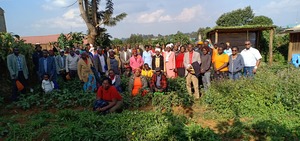
The "Global Forum on Biological Control and Training Workshop on Biological Control for Fall Armyworm" was hosted in Nairobi by FAO, FiBL, and icipe. In addition to other activities, the participants of the forum visited the long-term trials of SysCom Kenya. The forum's main focus was on biological strategies to manage the fall armyworm. The particular interest of the 131 participants was the practical examples of how to deal with the invasive pest. Different intercropping systems and a self-made botanical, made from locally available plants, used to suppress the worm were presented.
Ten days international course on dynamic agroforestry (June 2023)
In June, ECOTOP organized a ten days international training course on dynamic agroforestry. Three participants came from the Ghanaian governmental institution on Cocoa COCOBOD and CRIG, others from Uganda and Tanzania and Central and South America. All participants were very impressed with the experiences and the field visits and Ghanaian delegation has expressed great interest in establishing dynamic agroforestry in their national cocoa program.
A video of the course should be available shortly on EcoTop YouTube Channel: here.
Scientific congress in Bolivia (April 2023)
A three-day technical-scientific congress on succesional and dynamic agroforestry systems in the north of La Paz was held in April 2023. The initiative came from the Municipality of Alto Beni, willing to showcase and promote the region's vast experiences in agroforestry and organic production and to communicate to the Bolivian government that those experiences should be considered an alternative pathway to economic development. The second day was held at Sara Ana Center, where participants could visit the SysCom trial sites and got presentations of scientific results as well as demonstrations of technical and didactical activities.For the video click here.
Training on Bolivian national cacao (March 2023)
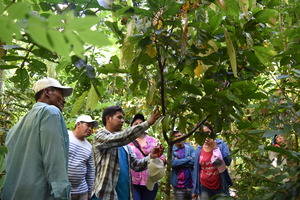
In March FiBL and ECOTOP conducted a one-week training course on Bolivian National Cacao for participants from the Bolivian Amazon. For this course we could make use of our six Participatory-on-farm trial plots and scientific results on this unique Cacao genotype, which is demanded for its high quality and interesting for Bolivia as its harvest period is at the end of the wet season, with less risks of cold waves affecting its quality.
Portrait series: "Faces of Organic Cotton" (November 2022)
The "Faces of Organic Cotton" series was born out of FiBL researcher Eva Goldmann's desire to make the people more visible, whose lives are closely linked to organic cotton and the SysCom-Project. The result is eleven portraits in which people provide a very personal insight into their everyday lives. The portrait series was produced during a stay of scientists from FiBL Switzerland to SysCom India. During their visit to the project area in October 2021, the FiBL scientists were impressed by the conviction people have about organic agriculture and how it is an integral part of their lives, surely more than just a way of farming.
SysCom cross-country event (August 2022)
On August 26, the partners from the program "Farming Systems Comparison in the Tropics" (SysCom) from Bolivia, Kenya and India met at FiBL Switzerland in Frick to reflect on the research findings from 15 years of comparison research with a focus on productivity and profitability, soil fertility biodiversity, and climate change/water management. Furthermore, the participants discussed the research priorities and way forward for the next phase of the program starting in 2023.
SysCom alumni event (August 2022)
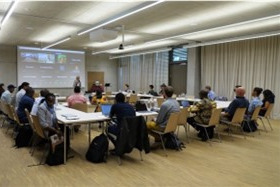
Various students and interns presented their work related to SysCom during a semi-public conference on the 22nd of August in Frick. The conference was visited by 50 participants, including 14 speakers presenting on soil, biodiversity, pest and disease, farmer livelihood, and more. It was interesting to see which path the alumni went in recent years showing various occupations in farming, academia, research and extension. Abstracts of the presentations can be downloaded below.
Indian cotton farmer meets Swiss influencer (February 2022)
Around half of the world's organic cotton production comes from India. Anina Mutter, a sustainability blogger from Zurich, is interested in the impact our purchasing decisions have on local farmers. Ever since, she has dealt with the topic in depth, and now only buys as many new clothes as needed, and if she does, it should be fair fashion or second-hand clothes. She immediately accepted when FiBL offered her the opportunity to talk to Indian farmer Anirudhda Halve about his life and cotton farming. Anirudhda Halve is a dedicated organic farmer and is involved in FiBL's SysCom project.
Biovision symposium (November 2021)
Members of the SysCom Kenya team, Nancy Mwende and Felix Matheri, were presenting during this years Biovision symposium in the Volkshaus Zürich. Together with Fabian Kohler from Biovision they presented how agroecological approaches can reduce pest damage, increase biodiversity, and secure food production. The results were taken from our ongoing trials in Kenya that show that companion cropping and local botanicals can be used successfully in organic famring to control pests. Several SysCom members from India and Switzerland were also able to visit the symposium and support their colleagues.
SHIFT prize ceremony (November 2021)
The SHIFT prize awarded for the first time this year by the two foundations, Biovision and Agropolis, went to FiBL Switzerland's SysCom program. The independent jury of the SHIFT Prize awarded the SysCom program because it promotes sustainable development and contributes to the transformation of food systems. Because of the award ceremony, FiBL researchers from Switzerland first travelled to Montpellier (France), the headquarters of the Agropolis Foundation. They met with other award winners and researchers from the French network for development cooperation. The award ceremony took place during the "Agroecology Europe Forum 2021" held in Barcelona (Spain) from 17th to 19th November. This was also attended by SysCom researchers from Kenya and India, working for the International Center for Insect Physiology and Ecology Icipe in Kenya and the bioRe association in India.
GIZ/KfW webinar on agroecology (October 2021)
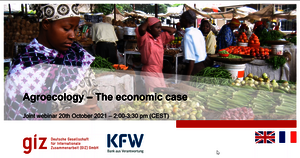
The SysCom team members, Beate Huber and David Bautze, presented the learnings of the SysCom trial during a internal joint webinar of the Deutsche Gesellschaft für Internationale Zusammenarbeit (GIZ) and the Kreditanstalt für Wiederaufbau (KfW) with the title "Agroecology - The economic case". During the presentation, the team could show that organic is a viable option for stustainable agriculture development. Organic can match the productivity and profitability of conventional if system-oriented management practices are applied. In addition, organic provides several environmental benefits. Next to the presentation, the team engaged in discussions with the workshop participants.
UNFSS side event "Can organic improve yields and incomes for smallholder farmers in Africa?" (September 2021)
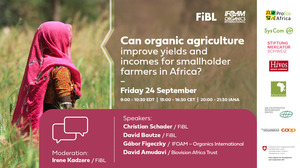
The SysCom team partnered with researchers from the ProEco Africa project who organized a second side event for the UN Food System Summit. The speakers could demonstrate that, if implemented well, organic agriculture can drastically boost productivity and farm incomes and thus substantially contribute to sustainable development in Africa. They also highlighted examples of various policy measures supporting organic and agro-ecology in African countries.
UNFSS side event "Is Organic Agriculture a viable option for the Global South?" (July 2021)
Debate is ongoing whether organic/agroecological approaches would be a realistic and innovative pathway for eliminating poverty and hunger and promoting responsible and inclusive healthier consumption and production in the Global South. The Research Institute of Organic Agriculture (FiBL), University of Ghana, Kenya Agricultural & Livestock Research Organization (KALRO), and Biovision Africa Trust have organized a side event for the Science Days of the UN Food System Summit where they presented unique results of 12 years’ comparative on-station and on-farm research in Kenya, Ghana, Uganda, Bolivia, and India. The presenters highlighted the benefits on productivity, profitability, and sustainability as well as trade-offs that organic systems and other agroecological approaches offer to society and the environment.
SysCom India - Introduction video (March 2021)
InfoPoint conference - Launching SysCom synthesis report (January 2021)
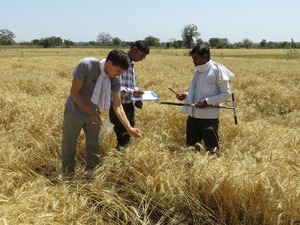
The SysCom team published a first report which provided a comprehensive synthesis of the scientific findings of SysCom. The report was launched during InfoPoint conference on the 28th January 2021. The report is presented in a form that is easy to understand. The findings address the differences between organic and conventional production systems in terms of productivity, profitability, soil fertility, and other indicators. The report also includes an overview about the results and recommendations for policy related stakeholders.
Award ceremony of the Swiss Forum for International Agricultural Research (SFIAR) (December 2019)
The SysCom Team was awarded with the SFIAR team award during a public ceremony at the 4th December 2019 taking place at the ETH Zürich. The SFIAR award is intended to award new, innovative and result oriented research. With this award the SFIAR pursues to support relevant agricultural research for development, and promote knowledge on and visibility of Swiss ARD.
West African Conference Organic Agriculture - Life for All (November 2019)
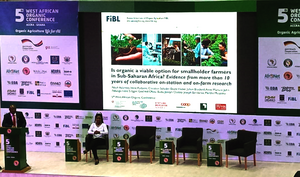
The West African Organic Conference (WAOC) is held every two years in one of the countries in the sub-region. About 300 participants attended the conference from academia, government institutions, NGOs, industry players within the sub-region, the continent and the larger organic world. Noah Adamtey from the SysCom team presented results from the SysCom program and other projects in the WAOC. His talk in the plenary session "Is organic a viable option for smallholder farmers in Sub-Saharan Africa - evidence from more than 10 years of on-station & on-farm research" showed performance of organic agiculture with regards to productivity, profitability and soil fertility.
EU/North-Africa conference on organic agriculture (November 2019)
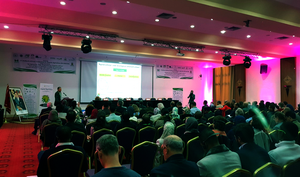
Harun Cicek from the SysCom team presented results from the SysCom program and other projects in the EU-NACOA in Marrakech, Morocco. His talk "“FiBL’s experience on smallholder organic agriculture relevant to North Africa" showed performance of organic agiculture in terms of comparative yields, soil quality and economics and how this information is relevant to the North African organic sector.
International Workshop - DOK trial in Switzerland (October 2019)
Marking 40 years of DOK field trial, FiBL (together with Agroscope and ETH) organized an international conference from 06. – 10. October 2019, at Monte Verità (Ascona), Switzerland. The event entitled “Comparing organic and conventional agricultural cropping systems - What can be learned from the DOK and other long-term trials?” was attended by scientists leading LTEs across globe. Results from SysCom program were shared in an oral presentation at the conference.
Tropentag conference in Kassel (September 2019)
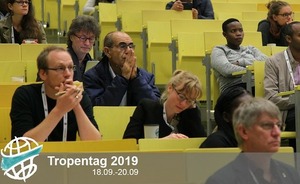
David Bautze from the SysCom team presented the results from the termite study (SysCom Kenya) at Tropentag in Kassel. The presentation was an outcome of the two published peer-review papers on termite abundance, diversity and damage in maize crops. Termites are an important ecosystem engineer, but also seen as major pests in crops. Managing termites on agricultural fields with the aim to protect termite diversity without loosing crop yield is a challenge, but solvable with agro-ecological approaches.
Workshop - The Contribution of Organic Agriculture to the SDGs: Scientific evidence from comparative research (February 2019)
The aim of the FiBL-led workshop was to stimulate debate on the role of organic agriculture and other agro-ecological approaches in the European and international development policy frameworks in the context of the 2030 Agenda for Sustainable Development. FiBL researchers presented the results from SysCom and other projects on the performance of organic agriculture in tropical and sub-tropical climate zones to an audience of over 150 people, which included participants from the European Commission, Members of the European Parliament, diplomats, academics, practitioners as well as civil society organisations.
Brussels Development Briefing - Sustainable agriculture: where are we on SDGs Implementation? (February 2019)
The Brussels Policy Briefing n. 54 discussed the 2030 Agenda for Sustainable Development, examining the status of implementation of the Sustainable Development Goals (SDGs), and the progress made with respect to Zero Hunger (SDG 2) on agriculture, food security and nutrition in ACP countries. In particular, the Briefing featured an exchange of views and experiences on: the policies, practices and partnerships that have been successful in driving the goal of SDG 2, with a focus on landmark developments at local, national and regional levels. SysCom team member Gurbir Bhullar was invited to present results from the SysCom program and other projects.
For further information: Report with highlights
Annual Swiss Development Cooperation Conference SDC/SECO (June 2018)
The Annual Swiss Development Cooperation Conference tooks place on 29th June in Bern. Topics of the conference were food security and urban development in Africa. The goal of the conference was to inform the general public about Swiss development cooperation and its commitment to food security and urban development in Africa. The SysCom team was present with a stall to showcase the results from SysCom Kenya.
Organic World Congress - Pre-conference "Accelerating innovation - the role of science, policy and practice" (November 2017)
On 8th November, the pre-conference "Accelerating innovation - the role of science, policy and practice" took place as part of the Organic World Congress in Dehli, India. The pre-conference was organized by the Research Institute of Organic Agriculture FiBL and TIPI, the Technology Innovation Platform of IFOAM - Organics International. The main objective of this event was to offer a common platform for dialogue between science, policy and practice to initiate the development of scientifically informed policy for practice oriented solutions. The SysCom scientist Dr. Gurbir S. Bhullar and Amrit Riar were part of the organizers and also presented results from the SysCom trials.
International Conference on Research for Development in Bern (September 2017)
The SysCom team was hosting two session at the ICRD conference in Bern, which was organised between the 5th - 8th September at the University of Bern. The title of one session was "Organic farming for improved livelihoods, health and food security in tropical smallholder farming communities" and aims to provide evidence that organic farming and agroforestry systems can improve livelihood and food security. This will was addressed from the point of view of the productivity, profitability, sustainability, ecosystem services and social learning aspects and how these components interact and influence the livelihoods and welfare of smallholder farming communities in Africa, Latin America and Asia.
"Farming Systems Comparisons Stakeholders Workshop" conducted in Kenya (June 2016)
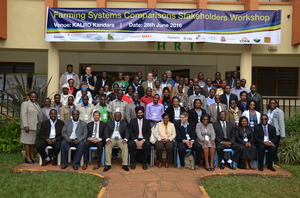
The Research Institute of Organic Agriculture (FiBL) Switzerland together with the Kenyan partners, Institute of Insect Physiology and Ecology (ICIPE), the Kenya Agricultural and Livestock Research Organization (KALRO), the School of Environmental Studies of Kenyatta University (KU), Kenya Institute of Organic Farming (KIOF), Kenya Organic Agriculture Network (KOAN) and the Tropical Soil Biology and Fertility Institute of CIAT (TSBF-CIAT) have organized a stakeholders’ workshop on the 28th June 2016 at KARLO-Kandara Center, Kenya. The objective of the workshop was to share the outcome of the research conducted in the last nine years with relevant stakeholders. National politicians, donors, farmers, journalists, researchers, students, agro-chemical dealers, and others attended the workshop. The main activities of the workshop include oral and poster presentations on the first-six year results and student studies (see Publications). In addition, there was a guided field visit to the trial sites in Thika (28th June) and Chuka (30th June).
Learning Event for Capacity Development: Participatory technology development and long term systems research to enhance the sustainability of agricultural systems – significance, contribution and challenges (August 2014)
With an objective of further developing the capacities of the research staff and fostering learning through mutual exchange, we organized a North-South learning event at FiBL during the last week of August 2014. The participants from our partner countries (Kenya India and Bolivia) joined this event and stayed with us for one week from 23. - 31. August. This event provided, for the first time, an opportunity of mutual learning and sharing among the teams located in geographically distant SysCom countries. Besides the training sessions on new research methodologies, technical tools, data management, quality control and reporting, a specific emphasis was laid on participatory research methodologies. A video documentation of the event can be seen by clicking on the picture on the right.
For further information: "Research to enhance the sustainability of agricultural systems" (Brief report)
Interview with Gurbir Bhullar (FiBL) about SysCom at the International Symposium on Agroecology (September 2014)
Dr. Gurbir Singh Bhullar, from the Research Institute of Organic Agriculture (FiBL), Switzerland discusses how Participatory On-farm Research (POR) is able to provide solutions that are tailored to individual contexts and problems. The interview was recorded in occasion of the International Symposium on Agroecology for Food Security and Nutrition, held at FAO HQ in Rome on 18-19 September 2014.
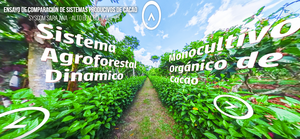
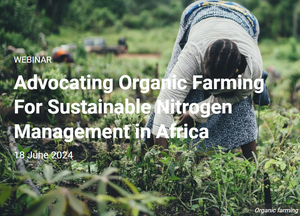
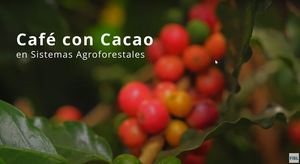
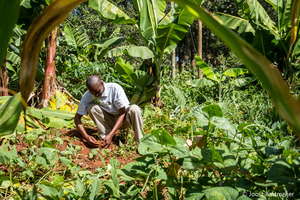
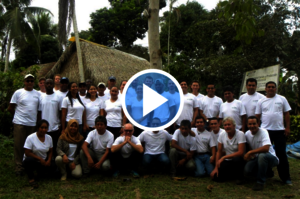
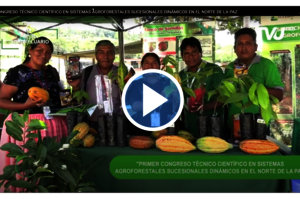
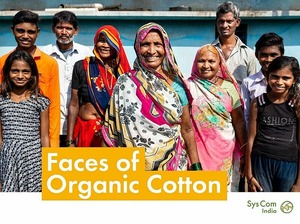
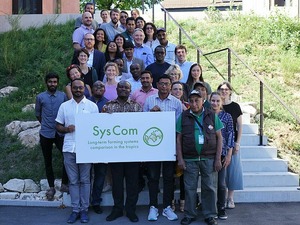
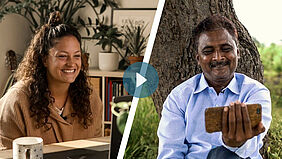
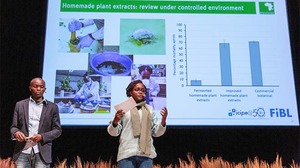
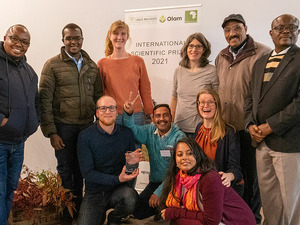
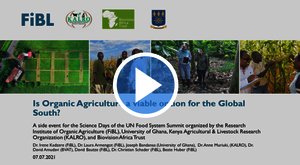
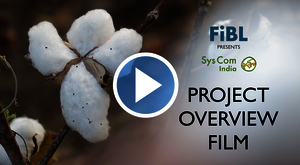
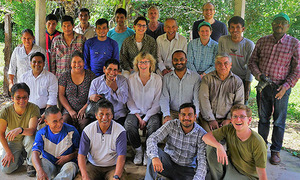
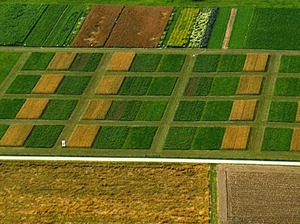
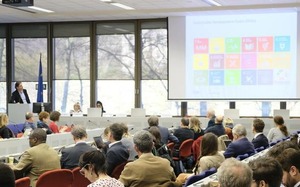
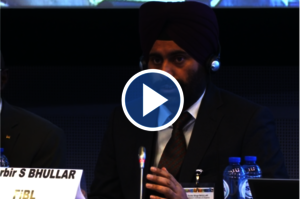
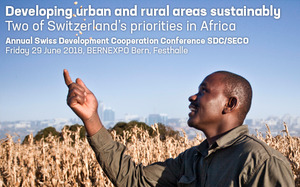

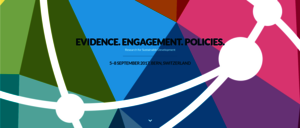
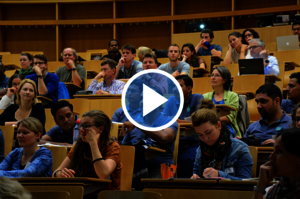
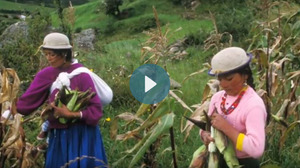
 tap and then scroll down to the Add to Home Screen command.
tap and then scroll down to the Add to Home Screen command.